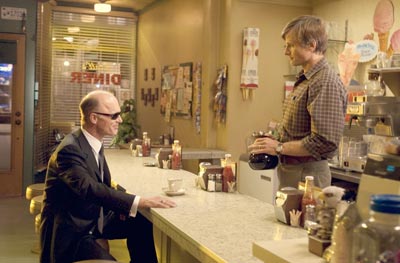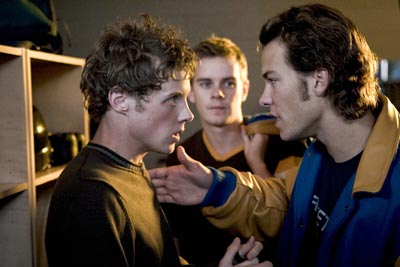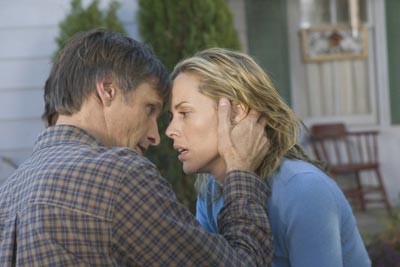A History Of Violence
Cronenberg sells out. Cinema screenings, not in the artistic integrity sense, you understand.

For some reason this latest film from David Cronenberg seems to prompt discussions as to whether he's 'sold out' or not, from usually sensible sources. What they mean to say is that he's produced a film in the shape of this John 'Judge Dredd' Wagner graphic novel adaptation that doesn't rely on silly shock value (Crash, anyone?) or shoehorned in props that look remarkably similar to vaginas. If you think that producing a top-flight thriller instead of another by this point cliched Cronenbergism is something to pillory the man for, we'd appreciate it if you left this site and never came back. It's not going to work between us. I'm sorry, it was fun while it lasted. Don't let the door hit your ass on the way out.
Tom Stall (Viggo Mortensen) runs a modest diner in SmallTownsVille, America's Heartland, a area almost Twain-esque in it's quiet, family values, flag waving stereotypiscism. Were this town to be cut, it would bleed apple pie. His wife Edie (Maria Bello) is happy with life, and their little kid Sarah (Heidi Hayes) is happy with life. Teenage son Jack (Ashton Holmes) may be having a few Dawson's Creek-esque bullying issues, but for the most part he's happy with life. As his family is happy with life, Tom is happy with life. The Waltons are envious. Which is all very pleasant.
Less pleasant events arise when two murderous thugs show up at Stall's place, making something of a nuisance of themselves. In the ensuing nastiness, Stall kills the two neerdowells and becomes a local hero. Tom's uncomfortable with the media glare this brings, but soon a more pressing concern comes in the shape of Carl Fogaty (Ed Harris) and his goons. They threaten, pester and bother Tom and his family all the while insisting that Tom's really an old mob 'friend' of theirs from back in the day. Is this an obstinate case of mistaken identity, or is something deeper going on?

To say much more would threaten to undo some of the tension and storytelling that History of Violence does so well, so we'll shut up about it. William Hurt shows up later on as Richie Cusack in a turn so engaging as to warrant mention, even if his appearance in the second half can't be spoken about too much for aforementioned reasons.
If you want to read this as a biting social satire on the inextricable connections violence has in today's life you're more than welcome. Should you want to link it to evolution's survival of the fittest concepts necessitating this violence, and the hereditary properties of this, again, fill your boots. That said, there are people out there who take silly zombie movies as the be all and end all of political allegory so you'll have to excuse us if we skip the starter of pretension and go on to the main course.
Which, now we come to mention it, is a very fine thriller indeed. Aside from the intriguing deliberate, methodical pace at which the narrative unfolds and the intelligent script, this movie contains another performance from Viggo Mortensen that proves that entirely the wrong people from the Lord of the Rings outings are getting the centre stage treatment. It's a delicate, complex performance that fits the multilayered character to a tee, and his relationships with his on screen family (themselves performing flawlessly) are utterly convincing. Harris has fun in his slightly offbeat bad guy role, and the overall result is a pleasure to behold. It's also one of the rare films that credits the viewer with an IQ reaching double figures.

So, is History of Violence violent? Well, in terms of quantity, not particularly. There's a few shootings and a couple of fistfights. There's more bloodshed on your average news programme, and certainly nowt like as much as Kill Bill, Sin City or for that matter Robocop and Commando. Where History of Violence differs to unwarranted occasional controversy and great effect is in showing the consequences of violence. Especially of late, film violence has been of the diet variety, either largely edited out (Hellllloooo, S.W.A.T.) or shown sanitised of effect. History of Violence doesn't pull it's punches or spare the results of Stall et al's actions. If someone is punched in the nose a few times they'll fall to the ground as per every other film, but you'll also get to see the bloodied gap where said nose used to be before it was forcibly inserted into the poor goon's cranium.
This isn't a reason to see the film of course, but it's a noteworthy aspect of it. There are inevitable consequences to acts of violence, and these are often ignored in movies. Having the gumption to show the obvious but rarely seen truth that violence is a messy solution to the problem is commendable, and despite the earlier diatribe against reading too much into films should give you pause for thought as to how fighting and killing can be glamorised by default rather than design merely by following the same paths every other director would go down. If you're still thinking that Cronenberg's sold out after realising this, there's really no hope for you.
Were I in the business of passing quantifiable judgements, I'd award this 4/5 TippyMarks.
Maria Bello (Edie Stall)
William Hurt (Richie Cusack)
Ed Harris (Carl Fogaty)
Ashton Holmes (Jack Stall)
Heidi Hayes (Sarah Stall)
Stephen McHattie (Leland Jones)
Greg Bryk (Billy Orser)
Peter MacNeill (Sheriff Sam Carney)